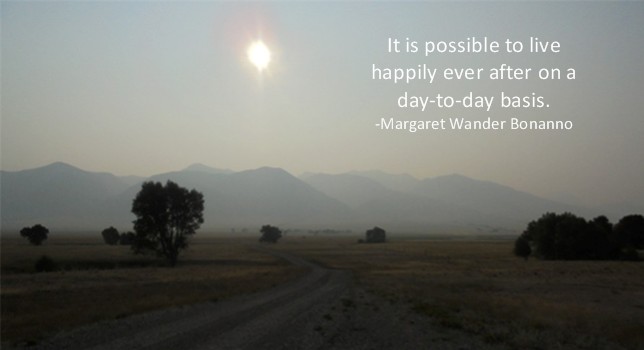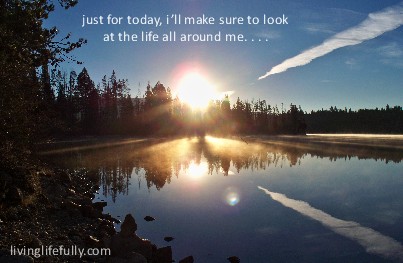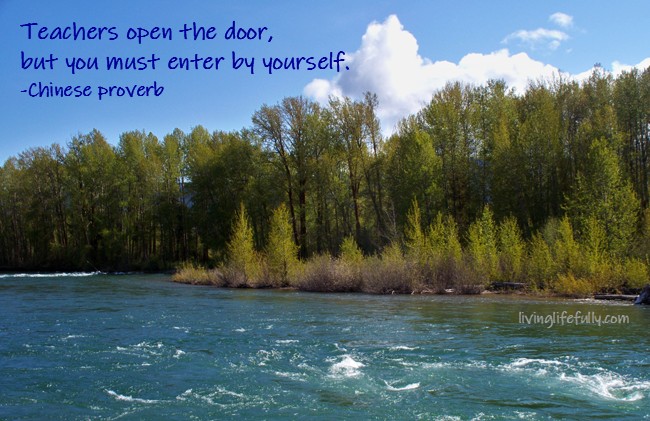|

17 June 2024
| |
|
|
| |
|
Simple and Profound
Thoughts
(from Simple
and Profound) |
|
The
true joy of humankind is in doing that which is most proper to our
nature; and the first property of people is to be kindly affected
towards them that are of one kind with ourselves.
-Marcus
Aurelius |
If you
would be interesting, be interested; if you would be pleased, be
pleasing; if you would be loved, be lovable; if you would be helped,
be helpful. -unattributed |
|
Reputation is what men and women think of us;
character is what God and
the angels know of us. -Thomas Paine
|
Drag
your thoughts away from your troubles--by the ear, by the heels, or
any other way you can manage it. It's the healthiest thing a
body can do. -Mark
Twain |
|
| |
|

|
| |
The
Principle of Now
Wayne
Dyer
You've
heard it many times, so often in fact that it has
become a cliché: Live in the present.
The now is all there is. Forget about the past;
it's over. Don't worry about the future; there
is only today. While these are familiar
refrains, the truth is that living in the now
is an elusive activity for virtually everyone.
It may be easy to say, but it's very tricky to do day
in and day out. And yet, Alan Watts is
absolutely correct in the above quotation when he
states that it "already is the case."
This is why living in the present moment is so
baffling.
Think
about the past and you're not living in the now. . .
but the now is the only time available for thinking
about the past! Live in anticipation of the
future and you're admonished for not being here now. .
. but now is all you have for engaging in that
delicious "futurizing." Thus, as Alan
Watts reminds you, you strive for what already is.
To be in the now is really your only option. But
the real question isn't how to live in the now,
it's how to use the now by being
present--rather than wasting it on reflections of the
past or concerns about the future. . . .
Ego,
Excuse Making, and the Elusive Now
After
spending several days preparing to write this chapter,
I was trying to focus on its significance when I
decided to go for a long swim in the ocean. As I
walked toward the water, I noted that I felt some
tension in my solar-plexus region. It wasn't
anything serious--it was just the discomfort I often
feel when I have many things to do or decisions to
make.
|

|
At
the moment I was about to dive in, my thoughts went
back to the reading I'd just finished on the
psychology of the now. I decided to see if I
could totally immerse myself in the moment (which, of
course, meant that I was in fact striving for what
"already is the case," since I have no other
moment than this one), only this time, I'd be fully
present, letting everything just be. I wouldn't
worry about the ache in my chest, think about how cold
the water would be or which direction the current was
flowing, or rehash all the things I had on my current
to-do list. I'd simply be in the now.
I
indeed let everything go and stayed focused on the
instant, the place, and the surroundings. And
something strange and wonderful happened. My
chest stopped hurting, I loosened up, all of my
anxiety dissolved, and I felt totally energized.
For the next 60 minutes or so, I moved through the
water staying 100 percent present. The moment I
decided to just be there completely, with all other
thoughts pushed aside, the discomfort I was
experiencing disappeared. Moreover, I had the
most peaceful swim I've ever had, and I emerged from
the water fully refreshed.
My
conclusion is that the present moment is an antidote
for the pain and difficulties we experience, which we
habitually try to soothe with rationales and
explanations. When we plunge ourselves 100
percent into the now, experiencing it and nothing
else, we're on an Excuses Begone! journey, with
no need for all of those old habituated thinking
patterns.
In
fact, excuses are simply what you've developed to
explain now moments that are tangled into the past or
future. If you're truly in that blissful
presence of the now, there's no desire to alter what
is. When your sentences express that "It's
going to be difficult . . . it will take a long time .
. . I'm not smart enough . . . I'm too old,"
you're wasting a present moment with excuses from a
not-now moment! And when are you having these
thoughts? You guessed it--the only time you have
a thought is in the now. So if your present
moment is being used up replaying why present-moment
thinking is incorrect (making excuses), is it
available for you to do something constructive?
Obviously not!
All
excuses are avoidance techniques to keep you from
taking charge and changing your thinking habits.
If you weren't rehashing your excuses but were instead
immersed in the now, you'd be experiencing your own
form of the bliss and healing that took place for me
during my magical swim. You see, when I removed
ego from the moment, I stopped thinking about myself
and focused on being fully present--and then I was
able to be truly here without ego's
excuses. I had plenty of explanations for the
tension in my chest, but when I moved totally into the
now with no other thoughts, the excuses disappeared
along with the pain.
|
|
more
thoughts and ideas on now
|
|
| |
|

|
|
quotations
- contents
-
welcome
page
-
obstacles
the
people behind the words
-
our
current e-zine
-
articles
and excerpts
Daily
Meditations, Year One - Year
Two - Year Three
- Year Four
Sign up
for your free daily spiritual or general quotation ~ ~ Sign
up for your free daily meditation
|
| |
|

|
We
have some
inspiring and motivational books that may interest you. Our main way of supporting this site is
through the sale of books, either physical copies
or digital copies for your Amazon Kindle (including the
online reader). All of the money that we earn
through them comes back to the site
in one way or another. Just click on the picture
to the left to visit our page of books, both fiction and
non-fiction! |
|
| |
|

|
| |
from
Wake
Up and Live
Dorothea Brande
(1936)
Fortunately, it is not at all necessary to be put under
the sway of another's will in order to do our own
work. The solution is far simpler. All that
is necessary to break the spell of inertia and
frustration is this:
Act as if it were impossible to fail.
That is the talisman, the formula, the command of
right-about-face which turns us from failure towards
success.
Clear out, by an easy imaginative feat, all the
distrusts and timidities, all the fears of looking
ridiculous which you may hardly suspect of being
treacherous troublemakers in your life. You will
find that if you can imaginatively capture the state of
mind which would be yours if you knew you were going
towards a prearranged and inevitable success, the first
result will be a tremendous surge of vitality, of
freshness. Then--well, the only way to put it is
that it will seem as though your mind gave a great sigh
of relief, of gratitude for the liberation, and
stretched itself to its fullest extent. This is
the moment where one may be forgiven for feeling that
there is something truly magical about the whole
affair. There will appear an extension of capacity
which seems more than normal.
Then the long-dammed-up flow sets in: directly,
irresistibly, turned at last in the right direction, the
current gathers strength from minute to minute. At
first you may still harbor some fear that the spell
which worked so instantaneously may break in the same
way. It will not, simply because it is no spell; it is a
reminder to yourself of the way in which work can always
be successfully undertaken. If you remember that,
far from your seeing the successful action stop, you
will find that each hour of unhampered activity opens
out into a promise of others in the future. There
may actually be some embarrassment from seeing too many
expanding possibilities until you have learned to
organize your new life.
Those fears, anxieties and apprehensions, you see, were
far more than mere negative things. By acting as
if they were important, you endowed them with
importance, you turned them into realities. They
became parasitic growths, existing at the expense of
everything that is healthy in you. While we allow
them to sap us, we are allowing the nourishment which
should go towards expanding growth to be used for
feeding monsters, cherishing the freaks and by-blows of
the mind instead of its extraordinary and creative
elements. So that it is not that one is suddenly given
wonderful new powers; by ceasing to let fear hold its
frustrating sway we come into the use of already
existing aptitudes which we formerly had no energy to
explore. We discover that we already possess
capacities we had not suspected, and the effect, of
course, is as though we had just received them.
And the rapidity with which these capacities make
themselves known when once the aspects are favorable for
them is truly somewhat startling. It is even more
enjoyable.
Next, there is the further experience of seeming to
become, in contrast with one's old self, practically
tireless. Actual records of working periods
introduced by using this formula would strain the
credulity of those who have never yet had the
experience. And these periods are not followed by
any depressed reaction. There is always so much
ahead, and it is so clearly seen, that there is no
chance for depression to set in when the mind is turned
back from its onward drive to consider all the
tribulations of the past, all the possible mischances
which might conceivably happen, it cannot, of course, at
the same time explore the road into the future.
But once absolve it of the thankless and unnecessary
task, and it rewards you by seeming to fly where before
it had stumbled and groped.
It takes some self-education to learn how to go from one
item of successful work to the next, not to lose time
and spend strength---much more happily, but just as
surely---in gloating over either the ease with which the
task as done or in contemplating too fondly the truly
remarkable work one has just been so fortunate as to
produce.
But a few days' Harvest Home is quite excusable; and
since, still resilient and unexhausted, one looks
forward to further activity with enjoyment, there is no
permanent danger that the first success under the new
regime will be the last.
If you are tempted to look askance at this procedure, to
feel that you are being invited to deceive yourself into
a feeling of success, you are quite wrong. We are all
pragmatists and empiricists in our daily life; what
"works" for us is our practical truth, and
becomes the basis of our further activity.
"Our thoughts become true in proportion as they
successfully exert their go-between function," as
William James says. And even more fully and
convincingly, the late Hans Vaihinger worked out these
conceptions in his book, The Philosophy of "As
If." Not everyone will go with him to the
furthest boundaries of his theory, but it is certainly
plain that in most matters of life each of us must act
as if this or that fact were a self evident truth.
For one thing, if we insisted on proving the reality or
efficacy or even probability of most of the conceptions
on which we base our practical procedures, we should
have no time left in which to act. So, in general,
we accept the premises for action which are presented to
us on good authority, and use them as proved unless or
until our experience causes us to doubt the wisdom of so
doing. Then we may reexamine them and perhaps
reach different conclusions from our mentors, but for
the most part we all act as if our norms of conduct, our
standards of values, were eternally and everywhere
valid, so long as they prove practicable for us.
In everyday life, then, if you are ineffectual in your
daily encounters and unproductive in your work, you are
to that extent acting as if you willed to fail.
Turn that attitude inside out, consciously decide that
your "As If" shall be healthy and vital, shall
be aimed towards accomplishment, and you have made
success a truth for yourself.
"The law of nature is: Do the thing and you
shall have the power; but they who do not do the thing
have not the power."
|
|
| |
|

|
|
Living
Life Fully, the e-zine
exists to try to provide for visitors of the world wide web a
place
of growth, peace, inspiration, and encouragement. Our
articles
are presented as thoughts of the authors--by no means do
we
mean to present them as ways that anyone has to live
life. Take
from them what you will, and disagree with
whatever you disagree
with--just know that they'll be here for you
each week. |
|
| |
|
I still find each day too short
for all the thoughts I want to think,
all the walks I
want to take, all the books I want to read,
and all the
friends I want to see. The longer I live the more my mind
dwells upon the beauty and wonder of the world. I hardly
know
which feeling leads, wonderment or admiration.
John Burroughs
|
| |

Beauty
This world is
full of beauty. It's full of things and places and people
and animals who share their beauty with us each day--but
unfortunately, we've been conditioned over the course of our lives
not to see that beauty any longer, if we ever noticed it in the
first place. And therein lies the problem with beauty:
it has tremendous potential to make our lives richer, yet it can
only do when and if we notice it and appreciate it. So the
problem with beauty lies not in the beautiful object or person,
but in ourselves and our lack of awareness and gratitude.
Beauty is, they say, in the eye of the beholder. But this
isn't necessarily true. While there are some works of art or
industry, for example, that one person may find beautiful and
another may find horribly ugly, the fact that I don't see
something as physically attractive does not mean that it is devoid
of beauty. This is especially true in people--our society
teaches us that certain types of looks are more beautiful than
others, so it's very easy to miss the beauty in a person whose
looks don't match the societal "ideal." And this
is a huge shame because if we're unable to see the beauty in other
people who are, indeed, beautiful, then our lives are much, much
poorer.
|
|
|
|
The fact that we can't see the beauty in
something doesn't suggest
that it's not there. Rather, it suggests that we are
not looking carefully
enough or with a broad enough perspective to see it.
Richard
Carlson
|
|
|
Seeing beauty
isn't necessarily all that easy, though. I've
known many people who do their best to hide their
beauty, often simply because they don't think
they're beautiful at all. They hide their
talents and abilities, and they show the world their
hardness or their anger, and that's a facade that is
very often difficult to see through. Some
young girls who have been made to feel ugly learn to
dress and act in unattractive ways; some young boys
who don't feel at all beautiful do their best to
make themselves ugly, either through their actions
or their clothing or their hygiene.
But beauty is an important part of our world, and
thus an important part of our lives. And
beauty is something that we all share, both in its
possession and in the enjoyment we get from
it. If I'm able to see your beauty clearly--in
your eyes or your smile or your words or your
actions, then my life is richer. If you're
able to see mine, your life is richer. If I
hide my beauty, though, I won't be making your life
even the slightest bit more positive.
Most of us need to make an effort to be able to see
beauty more easily. It makes me feel awful to
think of how often I've taken people for granted as
just "ordinary" people with no real
beauty, only to see later that their beauty was
amazing--it was just somewhere that I hadn't even
thought of looking. My own judgmental attitude
and inability to recognize something that was right
in front of my eyes kept me from experiencing some
amazing things. It's taken me a long time to
learn to actively seek a person's beauty, or a
town's beauty, or a work of art's beauty, but
nowadays I think that if I don't see the beauty
immediately, that's a sign that the beauty is
probably going to be more extraordinary than
superficial beauty usually is.
|
|
|
|
People
should hear a little music, read a little poetry, and see a fine
picture every day of their lives, in order that worldly cares may not
obliterate
the sense of the beautiful which God has implanted in the human soul.
Johann
Wolfgang von Goethe
|
|
|
Far too often,
we consider superficial beauty to be the true
indicator of beauty, and that's far from the
case. Yes, the spectacular sunset is
beautiful, but the less dramatic sunsets have their
own subtle beauty, too. Some trees don't seem
to be nearly as beautiful as others, yet what they
contribute to the planet is necessary and,
therefore, beautiful. Sometimes we need to
look very closely at things to see the beauty of
their intricacy, while other times we may be looking
too close and we should back up a bit to see the
beauty in the bigger picture.
The appreciation of beauty is a gift that we should
not squander. But it's also a gift that we
should not allow to be affected by the superficial
mores of our culture--we should not let other people
define beauty for us. If we do so, we're
making our lives poorer, for then we will lost out
on much beauty that remains unrecognized and
unappreciated. When we're able to recognize
beauty, we then allow wonder and awe to be an
important part of our lives, and these two
attributes also contribute much to a healthy and
fulfilling life.
If we actively make an effort to allow beauty to be
an important part of our lives, then we can enrich
our lives ourselves. And if we make sure that
we define beauty ourselves, based on our instincts
and our personal tastes, we won't spend a lot of
time wondering why we don't feel the same way about
a particular object or person that other people
feel. As Jean says below, the appreciation of
beauty opens doors to our souls, and those are doors
that always should be open.
|
|
|
|
As I
experience it, appreciation of beauty is access to the
soul. With beauty
in our lives, we walk and carry
ourselves more lightly
and with a different look
in our
eyes. To look into the eyes
of someone beholding
beauty is to look
through the windows
of the soul. Anytime
we catch a glimpse of soul, beauty
is there;
anytime we
catch our breath and feel "How beautiful!,"
the
soul is present.
Jean
Shinoda
Bolen
|
|
|
|
I've reached a
point at which I can see beauty in almost
everything, even litter on the highway (in its
texture or shape or form) or other things that don't
seem to have any inherent beauty. (Of course,
I pick up all the litter I can, because even if it
does have some beauty, the natural state of a place
is usually better.) In being able to recognize
and appreciate the beauty in the world in which I
live, I've given myself a tool that can help me to
feel better when I feel down, that can help to elate
me when I need to feel elation, that can brighten a
dull day or make even brighter a day already
bright. Seeing and appreciating beauty is a
gift that I can give to myself whenever I feel the
need. And when I do this, my life is brighter
and my spirit soars, knowing that I'm not neglecting
it at all.
|
|
|
|
More
on beauty
|
|
|
|
|
| |
|

|
| |
|
 ™ ™
|
|
All contents
© 2024 Living Life Fully™,
all rights reserved.
Please feel
free to re-use material from this site other than
copyrighted articles--
contact each author for permission to use those.
If you use material, it would be
greatly appreciated if you would provide credit and
a link back to the original
source, and let us know where the material is
published. Thank you. |
|
| |
|
Always, I suppose,
if you have a few perfect days, you can count on some kind of
trouble. But whether or not you live with a happy attitude
depends on your own cast of mind and the power of your
faith. What you think determines what you are.
Norman
Vincent Peale
|

|
|
| |
I
remember this illumination happening to me one noontime as I stood
in the kitchen and watched my children eat peanut butter and jelly
sandwiches. We were having a most unremarkable time on a
nondescript day, in the midst of the most quotidian of
routines. I hadn't censed the table, sprinkled the place
mats with holy water, or uttered a sanctifying prayer over the
Wonder bread. I wasn't feeling particularly
"spiritual." But, heeding I don't know what
prompting, I stopped abruptly in mid-bustle, or mid-woolgathering,
and looked around me as if I were opening my eyes for the first
time that day.
The entire
room became luminous and so alive with movement that everything
seemed suspended--yet pulsating--for an instant, like light
waves. Intense joy swelled inside me, and my immediate
response was gratitude--gratitude for everything, every tiny thing
in that space. The shelter of the room became a warm
embrace; water flowing from the tap seemed a tremendous miracle;
and my children became, for a moment, not my progeny or my charges
or my tasks, but eternal beings of infinite singularity and
complexity whom I would one day, in an age to come, apprehend in
their splendid fullness.
Holly
Bridges Elliott
|
|
| |
|
|

|
| |
|
Don Juan
assured me that in order to accomplish the feat of making myself
miserable
I had to work in the most intense fashion, and that it was absurd.
I
had now realized I could work just the same in making myself complete and
strong.
"The trick is in what one emphasizes," he said.
"We either make ourselves miserable,
or we make ourselves strong.
The amount of work is the same."
Carlos
Castaneda
|
| |
|
